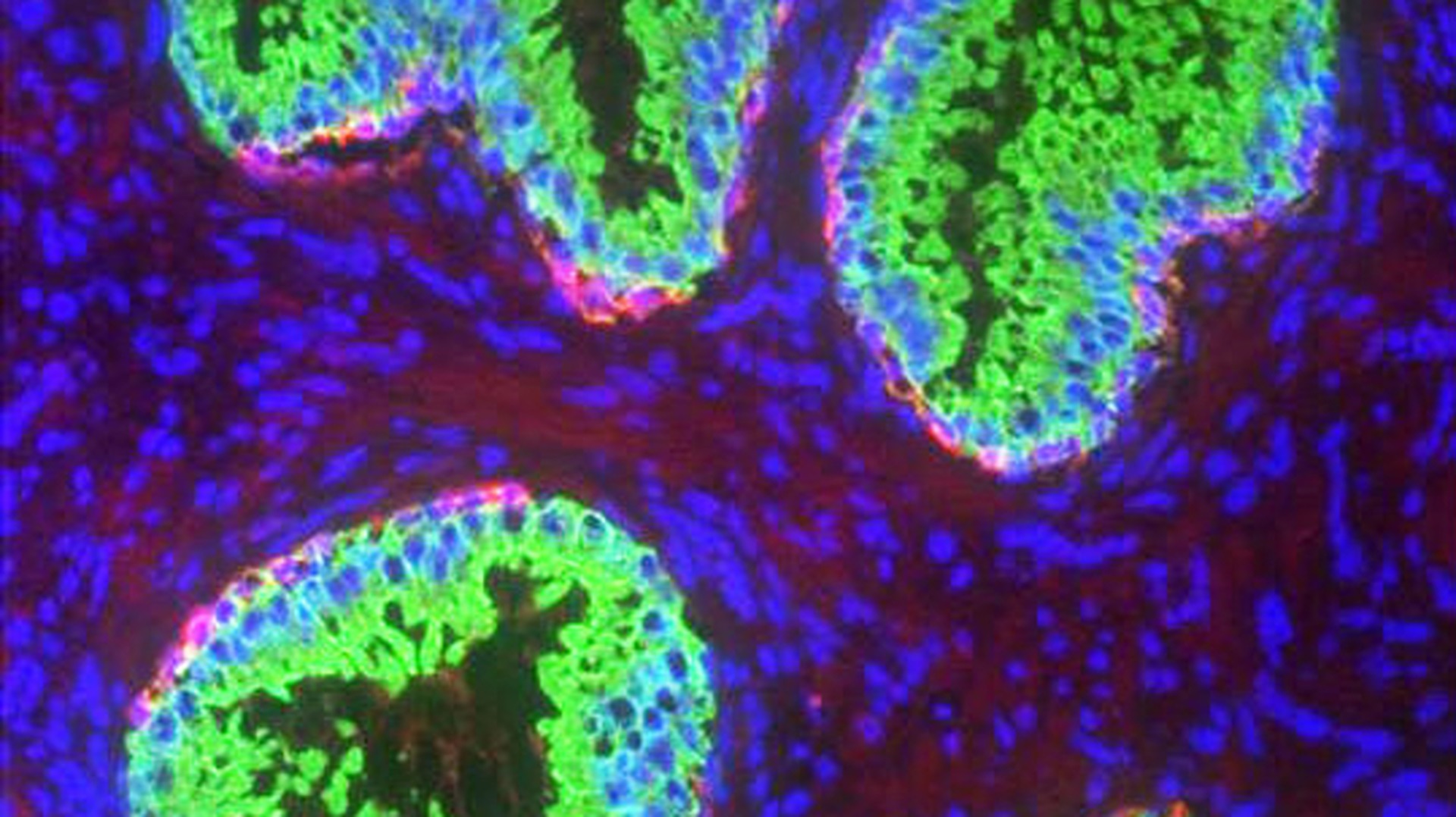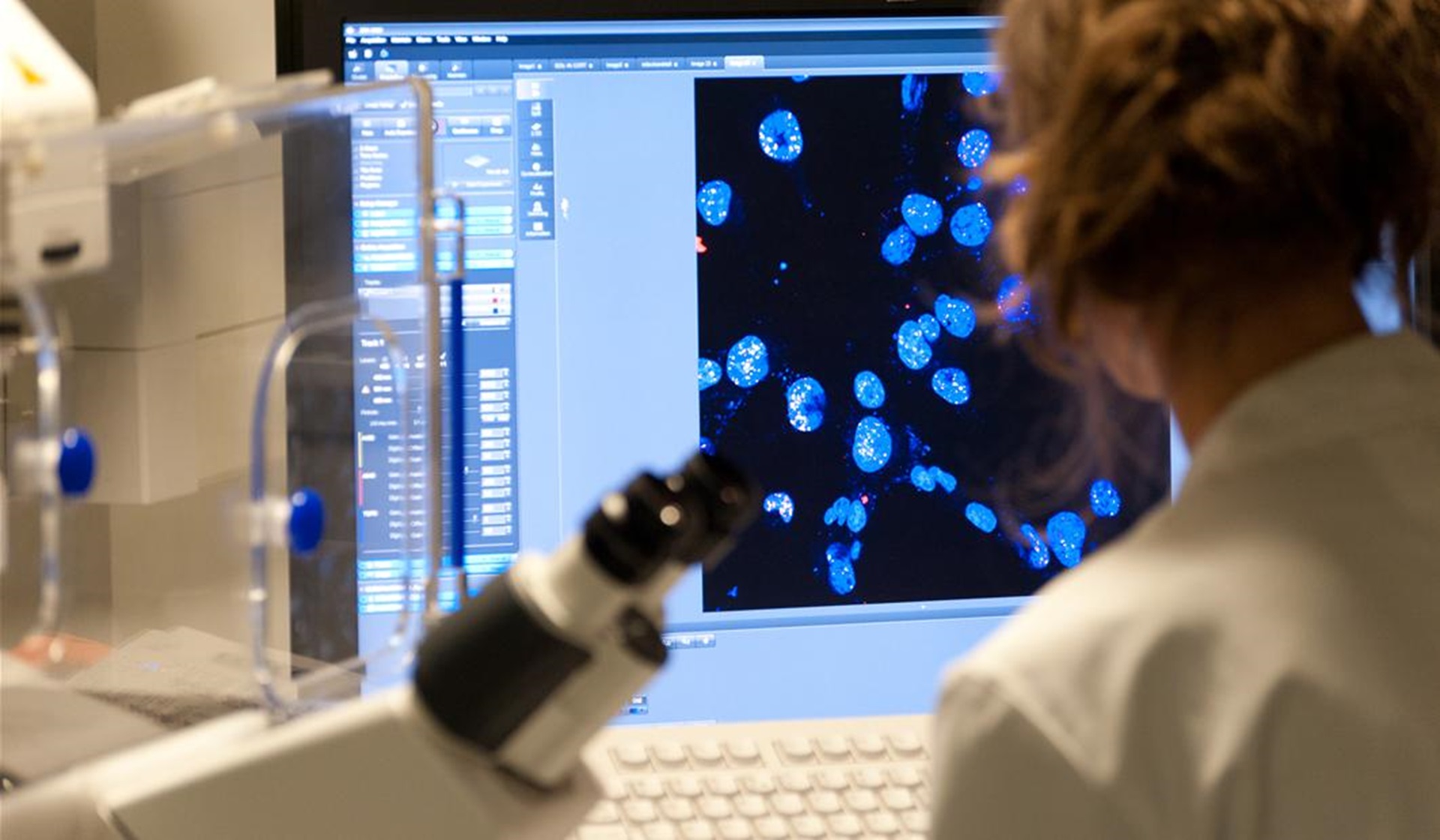Centre for Immunotherapy of Cancer
The Centre for Immunotherapy of Cancer (CIC), formerly known as the Centre for Translational Immunotherapy, aims to increase communication between clinicians and scientists with an interest in translational immunotherapy.
We are a virtual centre, bringing together staff and students from the ICR and our partner hospital, The Royal Marsden.
What is cancer immunotherapy?
Cancer immunotherapy is a form of cancer treatment that uses the body’s immune system to prevent and eliminate cancer. It has revolutionised cancer treatment over the last decade and the speed of development, testing and approval for immunotherapy treatments in a wide range of cancers has been remarkable.
However, our biological understanding of why immunotherapy works on some patients and not others remains poorly understood.
The CIC works as a platform for knowledge sharing and collaboration between all teams within the ICR and The Royal Marsden who have an interest in tumour immunology and who wish to develop their projects to answer immune-related questions.
Professor Alan Melcher co-leads the CIC with Professor James Larkin
How we research at this centre
Clinical testing in immunotherapy is outstripping our understanding of how it works biologically. While associations between some markers and response have been established, there is a need for biomarkers based on biological understanding.
In order to increase our understanding of the biology and mechanisms underlying what makes treatment successful, a bench to bedside and back approach is warranted including pre-clinical modelling and systematic immune-monitoring of cancer patients.
The ICR has major research activity in the field of cancer immunology. But this research is not necessarily led by researchers with a primary interest and background in this field.
As the immunomodulatory effects of more established cancer therapies (e.g. radiotherapy and chemotherapy) are being explored, there is a growing need for immune analysis within projects that may not directly involve immunotherapy treatment.
Immunogenomics
Integration of genomics and immunology to study the immune response. This involves high throughput interrogation of tumour antigen and T cell repertoires, and the analysis of mutations and gene expression using bulk and single cell sequencing. Using this information, we can interpret the functionality and effectiveness of the immune response.
Theme leads: Dr Ben O’Leary, Professor Trevor Graham
Single cell analysis
Immune profiling by flow cytometry and single cell RNA sequencing allows for identification and characterization of specialized and rare immune cell subtypes. Multi-parameter flow cytometry is a form of semi-automated, quantitative fluorescence microscopy with the ability to process large numbers of single cells in a short period of time. Using tailor-made antibody panels assessing up to 28 parameters simultaneously, researchers can perform a detailed and customized analysis of the tumour immune landscape.
Theme leads: Dr Erik Wennerberg, Dr Alan Dunlop, Hira Ale
Proteomics and peptidomics
Quantitative mass spectrometry analysis of tumour samples using global proteomics approaches to study how mutations determine cellular processes and immune resistance mechanisms, as well as identifying biomarkers of disease states including cancers-specific proteins, endogenous peptides presented on MHC Class I and II molecules (the immunopeptidome). These methods are important for precision medicine and development of new treatment strategies.
Global analysis of the proteome and immunopeptidome (peptides presented on MHC Class I and II molecules) by advanced quantitative mass spectrometry, are two crucial areas of research that provide deep insights into the antigen landscapes and cellular inflammatory signalling states.
These methods contribute to our understanding of immune recognition and the activation of adaptive immune responses. Together, proteomics and immunopeptidomics offer a comprehensive approach to understanding molecular biology, with implications for improving disease diagnostics, developing personalized treatments and designing novel therapeutic strategies.
Theme leads: Professor Jyoti Choudhary
Data Science and AI
With the increasing size and complexity of genomic, transcriptomic and proteomic data sets generated from patient samples and pre-clinical models, bioinformatic tools have become increasingly important for data analysis and deconvolution. Bioinformatic methods of network modelling and integrative data analysis work towards finding molecular patterns that describe active signalling pathways and identifying antigenic determinants that drive tumour immunogenicity, all of which aid in the design of personalized treatments.
Theme leads: Dr Anguraj Sadanandam, Adrian Larkeryd, Dr Maggie Cheang
Clinical trial translation
Development and design of clinical trials involving immunomodulatory treatments, with a particular focus on immune-monitoring of patient samples (eg tumour, blood, urine, ascites).
Theme leads: Dr Anna Wilkins, Dr Irene Chong, Dr Andrew Furness, Lorna Grove, Dr Lauren Aronson
Pre-clinical animal and human immune modelling
Using in vitro assays and animal models that accurately mimic the pathological conditions and therapeutic interventions seen in the clinic, hypothesis-driven pre-clinical modelling is essential for performing mechanistic studies and testing of novel combination strategies.
Theme lead: Dr Esther Arwert
Digital pathology
Digital pathology is the acquisition, interpretation and analysis of pathology information in a digital environment. Novel approaches to view and interpret digitized tissue slides, including AI-based deep-learning neural networks, allows for sophisticated mapping of the tumour microenvironment and for rapid and optimized identification of immune infiltration patterns across many samples.
Theme leads: Dr Tom Lund, Dr Ioannis Roxanis, Professor Manuel Salto-Tellez
Cell Therapy
Theme leads: Dr Andrew Furness, Dr Emma Nicolson
Cancer Vaccines
Theme leads: Dr Naureen Starling, Dr Lizzie Appleton, Dr Hazel Lote
Radiotherapy/Imaging
Theme lead: Dr Irene Chong
Collaborations
The Centre for Immunotherapy of Cancer is aligned to Imperial College, both within Cancer Research UK's ICR/Imperial Convergence Science Centre, and through the Imperial College led Immuno-Pathology Network (ImmNET), which brings together immunology researchers from a range of centres and disciplines, including cancer.
Support
The Centre for Immunotherapy of Cancer is supported by the CRIS Cancer Foundation.
The Centre hosts a monthly seminar series with the aim of highlighting the diverse projects in the field and promoting new collaborations across different areas of research. Organised by Dr Erik Wennerberg, Team Leader in Radiation-enhanced Immunotherapy, it constitutes a central part of the CIC initiative. As part of our alignment with the Convergence Science Centre, researchers from Imperial College regularly present their work. We also have upcoming talks by other collaborators, including researchers from KCL and The University of Leeds.
ICR staff can view the CIC seminar series on the Nexus calendar (login required). The Royal Marsden and Imperial staff can access the series via the seminar email notification.

